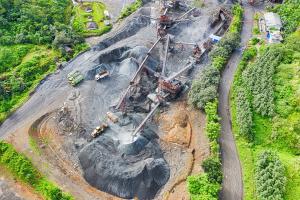
In 2022, international cooperation in energy and critical raw materials is high on the agenda. Optimal use of critical raw materials, for which demand is set to continue rising, will be crucial in delivering the green transition in energy, mobility and the digital world.
This will be in the spotlight at the UNECE Regional Forum on cooperation on enhancing sustainable management and financing for the critical raw materials required for low-carbon transitions, to be organised on 20 September ahead of COP27, with the Egyptian Presidency of COP27 and the UN Climate Change High-Level Champions for COP26 and COP27. The Forum is one of the series of five UN regional forums on “Towards COP27: Regional Forums on Climate Initiatives to Finance Climate Action and the SDGs”.
Over the course of 2022, a series of high-level international conferences have provided opportunities to engage with stakeholders across government, industry and civil society to encourage sustainable resource management. Among key tools is the United Nations Framework Classification for Resources (UNFC), developed at UNECE, which is the first widely accepted and internationally-harmonized system for classifying, managing and reporting natural resources.
At the EIT Raw Materials Summit in Berlin, UNECE contributed to a high-level panel discussing the need for responsible sourcing in the European Mining Sector, highlighting how UNFC can identify environmental and socio-economic viability in new resource projects, thereby putting an emphasis on responsible mining projects.
In Krakow, national experts met to discuss mineral deposits safeguarding. UNECE presented how nations can safeguard mineral deposits using UNFC by harmonising national and international standards to support common technology and knowledge transfer.
In Brussels, UNECE made a keynote speech at the Geological Survey of Belgium’s 125th Anniversary highlighting the role geological research can play in supporting climate targets into action. Data from geological surveys is critical to support data driven decisions when undertaking mineral projects. Local surveys following harmonized international standards is a significant analytical tool as part of UNFC and for the United Nations Resource Management System.
Building capacities to harness UNFC
Implementing UNFC can help countries create a unified and holistic framework for data-driven decisions and further statistical analysis. To help countries benefit from this tool, UNECE regularly provides training to governments, experts and civil society in the field in order to build consensus and partnerships for further international cooperation.
The training involves experts from UNECE’s Expert Group on Resource Management to support industry, higher education institutions, and governments to account for raw materials and ensure full transparency and traceability along the value chain.
One example is the Training Workshops on UNFC and its Application, hosted by the European Institute of Innovation and Technology (EIT) on Raw Materials – the largest raw materials consortium in the world – and EIT InnoEnergy – the first industrial alliance of the EU, which includes the European Battery Alliance (EBA) for battery storage. Another is recent training, as part of an EU-funded project, on UNFC for EU Member States, which are expected to embrace the harmonisation of resources within the UNFC classification.
Training workshops for Micro, Small & Medium Enterprises have also recently been undertaken to support businesses to achieve circularity. Events focused on Bosnia & Herzegovina, Serbia, Kyrgyzstan and Kazakhstan to present best practice for using UN policy instruments and recommendations.
Supporting the transformation of extractive industries and sustainable energy shift
Extractive industries including mining are a vital part of the global economy. UNFC is a unique tool for policymakers to put sustainability at the forefront of extractive policy decision making, and will contribute to the efforts of the new Working Group on Transforming the Extractive Industries for Sustainable Development, coordinated by UNDP, UNEP and the UN Regional Commissions (currently coordinated by UNECE).
In a recent policy brief, the UN Secretary-General António Guterres called for nations to ‘employ tools such as UNFC to implement a shared principles-based, integrated, sustainable resource management framework’.
UNFC can be fully incorporated across all resources and national policies thanks to bridging documents and case studies on regional, national and international industry-wide and governmental standards. It can also contribute to the circular economy by facilitating the use of resources otherwise considered “waste”.
In addition to its applicability to extractive industries, UNFC can also help countries scale up the use of more sustainable energy sources thanks to specifications for renewable energy sources including solar, wind, geothermal and bioenergy, as well as for the development of the hydrogen economy.

